5 things we learned from this week’s Champions League
There was disaster for United, joy for Madrid and honours even for Didier Drogba – the latest Champions League last-16 matches had plenty of talking points. Here is what caught our eye this week...
What is the ideal post-match interview?
At the moment, Manchester United just can’t win – and even when they do, well, it’s because if you start with Wayne Rooney, Robin van Persie, Juan Mata and Adnan Januzaj (as United did against Crystal Palace last Saturday), then you damn well should win anyway. But it was interesting to note the reaction to two post-match interviews after their insipid 2-0 defeat at Olympiacos – a defeat, let’s not forget, which still gives them more chance than the 2-0 first leg losses suffered by Arsenal and Manchester City (who admittedly played better against tougher opposition).
First up was Michael Carrick, who mumbled to ITV about "disappointment… controlled the ball but didn't really threaten… can still turn it round”. Pundit Roy Keane seemed as infuriated by that as the game: “It was flat, there was no fire, just like the performance.”
Soon after, Van Persie spoke to Dutch broadcaster NOS, and he did show some fire, seeming to criticise his team-mates for moving into his zones, and giving the general impression of someone annoyed with his colleagues and wishing Sir Alex Ferguson was still in charge. Keane may have appreciated that fire but it didn't do RVP much good: Van Persie’s comments are now being held up to suggest the coach might have lost the dressing-room.
Van Persie has some prior, by the way: not in criticising team-mates but in missing important chances in Champions League first leg away ties. He blasted United’s best chance against Olympiacos over the bar from eight yards out late on – a bad miss – and 12 months ago hit the crossbar and had another effort, which he should have scored, well saved by Diego Lopez in the 1-1 draw at Real Madrid.
As for Keane, he’s hardly the man from whom to take advice about post-match chat: it was his explosive interview with MUTV after United lost 4-1 at Middlesbrough in October 2005 that marked the end of his career at Old Trafford, and the start of his still simmering feud with Sir Alex Ferguson.
Madrid's future looks bright
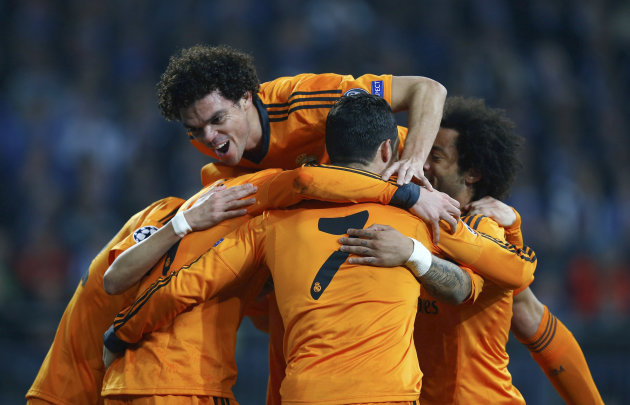 It was not just the nature of Real Madrid’s 6-1 thrashing of an admittedly below-par Schalke side that made this the outstanding performance of the week; nor that the front three each scored two goals for a side that, on current form, challenge Bayern Munich as competition favourites.
It was not just the nature of Real Madrid’s 6-1 thrashing of an admittedly below-par Schalke side that made this the outstanding performance of the week; nor that the front three each scored two goals for a side that, on current form, challenge Bayern Munich as competition favourites.
It was that, for the first time for many years, you sense that this Real Madrid has a long-term plan and a direction at last. Coach Carlo Ancelotti deserves huge credit, of course, having settled on a 4-3-3 system that gets the best out of Xabi Alonso and Luka Modric as well as his big-name forwards. But with the emergence of Jese Rodriguez, and the purchases of Daniel Carvajal and Asier Illaramendi, there is a Spanish flavour to the squad, while the likes of Raphael Varane keep it young too.
For once, club president Florentino Perez also has a succession policy in place. France Football this week reported that Zinedine Zidane is being lined up to replace Ancelotti in 2016, when the Italian’s three-year contract comes to an end. By then, Zidane will have finished his coaching badges, and Perez will be coming to the end of his term of office, which expires in 2017.
“Zizou is not afraid to be a number one and it’s impossible that he stays an assistant forever,” Perez told Canal Plus earlier this season. “He knows the job of coaching is different from being a player. When he started out as a player, he knew how to become the best. Now, he needs time to become a number one.”
He already looks the part, having swapped the pale blue Madrid tracksuits for a smart black suit and skinny tie on the touchline. And he has the perfect mentor in Ancelotti, his coach at Juventus from 1999-2001 and a man so secure as to not be worried by having “the most famous assistant coach,” as the Spanish press put it, alongside him.
How do you replace the irreplaceable?
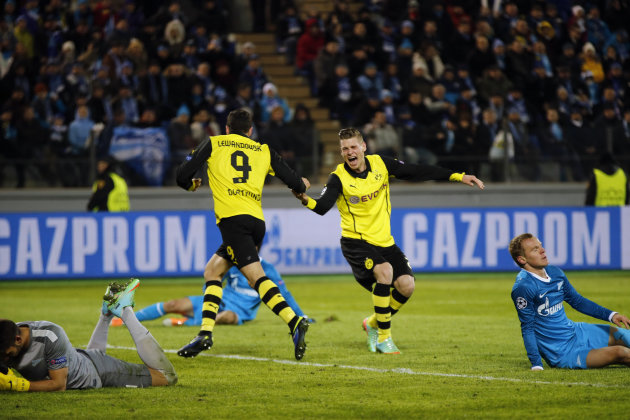 That’s the question that Borussia Dortmund fans might be wondering after, once again, Robert Lewandowski got them out of a jam in St Petersburg. He scored two goals to take his tally to 16 in 20 games in the last two seasons – more than Lionel Messi, and fewer only than Zlatan Ibrahimovic and Cristiano Ronaldo – but once the season ends, he is off to Bayern Munich.
That’s the question that Borussia Dortmund fans might be wondering after, once again, Robert Lewandowski got them out of a jam in St Petersburg. He scored two goals to take his tally to 16 in 20 games in the last two seasons – more than Lionel Messi, and fewer only than Zlatan Ibrahimovic and Cristiano Ronaldo – but once the season ends, he is off to Bayern Munich.
Dortmund have been linked to Hertha Berlin’s Adrian Ramos while negotiations with Edin Dzeko’s entourage have been mooted for months. The club last summer signed Pierre-Emerick Aubameyang, who has proven his eye for goal in his first six months. And while you might imagine that Dortmund without Lewandowski would be far weaker (and Bayern even stronger, scarily), just consider the players who have left Dortmund over the last three summers: in 2011, it was Nuri Sahin and Lucas Barrios, architects of their title success that season; in 2012, Shinji Kagawa and in 2013, Mario Goetze.
All have been effectively replaced, thanks to the smart manoeuvres of sports director Michael Zorc, who signed a new contract last week. Dortmund will find a way to survive without Lewandowski: the real worry would be trying to get by without Zorc.
What next for Zenit St Petersburg?
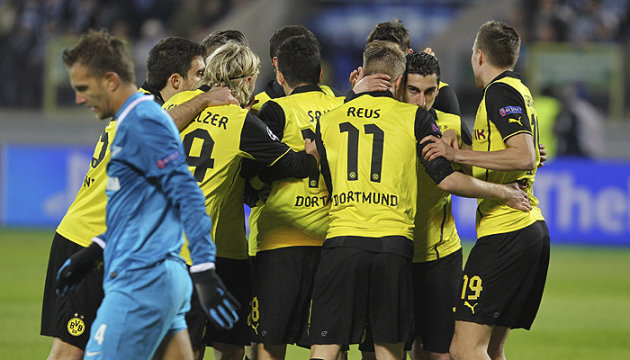 There may have been no better chance for the Russian champions to have made it into the Champions League quarter-final for the first time in their history: after all, they sneaked into the knock-out round with only six points from their group, and faced a Borussia Dortmund side that was missing five players that started last season’s Champions League final.
There may have been no better chance for the Russian champions to have made it into the Champions League quarter-final for the first time in their history: after all, they sneaked into the knock-out round with only six points from their group, and faced a Borussia Dortmund side that was missing five players that started last season’s Champions League final.
But the game was as good as over within five minutes, as the German visitors raced into a two-goal lead. On the two occasions Zenit pulled one back, Dortmund scored again minutes later. It would be no surprise if coach Luciano Spalletti, who made noises about returning to Italy over the winter break, leaves at the end of the season.
The more worrying question for Zenit will be if they will ever break into the elite. They last came this close in 2012, losing 4-3 on aggregate to Benfica in the last-16. Later that summer, the club’s owners Gazprom became an official partner of the Champions League and in September 2012 they spent €100m (£82m) on signing Hulk and Axel Witsel from Porto and Benfica (respectively). But since then, third-place in last season’s group stage and now facing elimination in Germany.
“We know that ‘big football’ and our football are different worlds that meet and overlap but also conflict,” wrote Eugene Zyryankin in Russian paper Sport Express. “But there is only one football, and it’s another reality from ours… and we cannot fit into it.”
It is a huge disadvantage to Russian clubs that their winter break lasts two months and that such a big game was Zenit’s first since December 11. But as Zyryankin added: “We are left with just one question that now needs answering: 'What were they doing for the last six weeks?'”
The Drogba reunion party continues
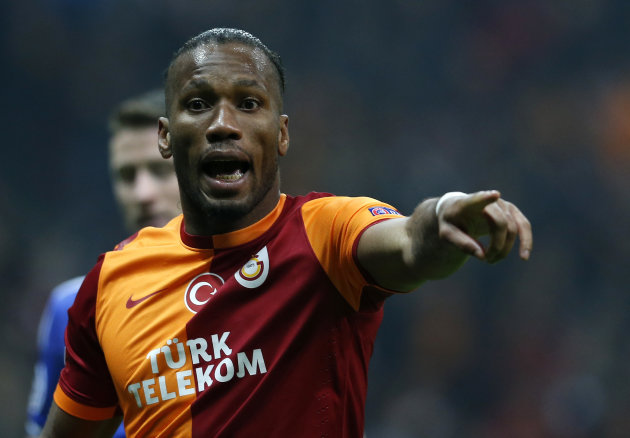 If it feels like the longest reunion ever, that's probably because it has been. For three months, since the draw in early December, Didier Drogba has been talking about meeting his old friends at Chelsea in this round. After a tense but ultimately even first leg – unlike the other seven ties – Drogba will return to Stamford Bridge for the first time as a player since winning the Champions League final in 2012 with this tie still in the balance.
If it feels like the longest reunion ever, that's probably because it has been. For three months, since the draw in early December, Didier Drogba has been talking about meeting his old friends at Chelsea in this round. After a tense but ultimately even first leg – unlike the other seven ties – Drogba will return to Stamford Bridge for the first time as a player since winning the Champions League final in 2012 with this tie still in the balance.
He is guaranteed a fantastic reception back at the club where you could argue that he is among their greatest ever players – but will he have the last laugh back at his spiritual home? The good news is that at least we only have another three weeks to wait.
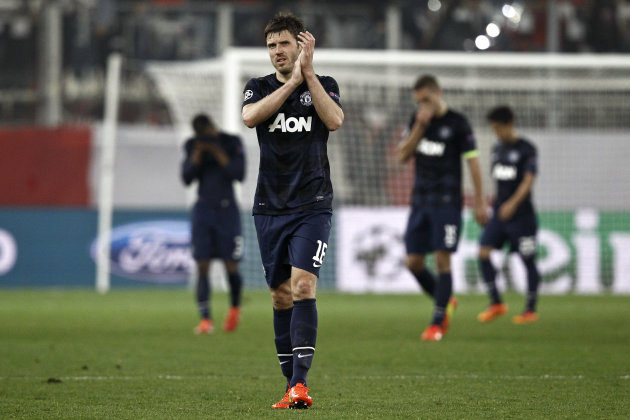
No comments:
Post a Comment